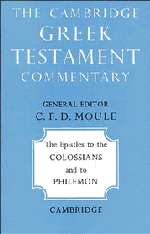Book contents
- Frontmatter
- Preface by the General Editor
- Contents
- List of Abbreviations
- INTRODUCTION
- I THE RELIGIOUS THOUGHT OF THE EPISTLES TO THE COLOSSIANS AND TO PHILEMON
- II THE CIRCUMSTANCES WHICH LED TO THE WRITING OF THE EPISTLES TO THE COLOSSIANS AND TO PHILEMON
- III TEXTUAL CRITICISM OF THE PAULINE EPISTLES
- NOTES
- APPENDIX OF DISCURSIVE NOTES
I - THE RELIGIOUS THOUGHT OF THE EPISTLES TO THE COLOSSIANS AND TO PHILEMON
Published online by Cambridge University Press: 01 June 2011
- Frontmatter
- Preface by the General Editor
- Contents
- List of Abbreviations
- INTRODUCTION
- I THE RELIGIOUS THOUGHT OF THE EPISTLES TO THE COLOSSIANS AND TO PHILEMON
- II THE CIRCUMSTANCES WHICH LED TO THE WRITING OF THE EPISTLES TO THE COLOSSIANS AND TO PHILEMON
- III TEXTUAL CRITICISM OF THE PAULINE EPISTLES
- NOTES
- APPENDIX OF DISCURSIVE NOTES
Summary
CHRIST
If one were compelled to select the single most striking aspect of the letter to the Christians at Colossae, the choice would probably fall upon its description, in verses few but almost intolerably weighty, of Christ and of his position in relation to the universe and the Church. For insight into other famous aspects of what this most vivid of evangelists preached (reasons will be advanced later for holding Colossians to be genuinely Pauline), one might turn first to other letters—to Galatians and Romans for deliverance from a legalistic religion, to the Thessalonian letters for certain conceptions of the Final Act of God's purpose (which in Colossians is not prominent: see on iii. 1–4), to the Corinthian letters for a variety of matters concerning community life and Christian doctrine. All these letters contain also very notable references to the position of Jesus in Christian faith. But nowhere is more striking evidence to be found of the way in which the ‘Nazarene impostor’ had taken up his position as Lord than in Colossians, which (assuming its Pauline authorship) may be dated at latest some thirty to thirty-five years after that Nazarene's ignominious death.
The ‘Great Christology’ of Col. i. 15 ff. is discussed in the notes on the text, where evidence is given for the origin of some of the words and phrases in Jewish and possibly pagan religious writings.
- Type
- Chapter
- Information
- The Epistles to the Colossians and to Philemon , pp. 3 - 12Publisher: Cambridge University PressPrint publication year: 1957



